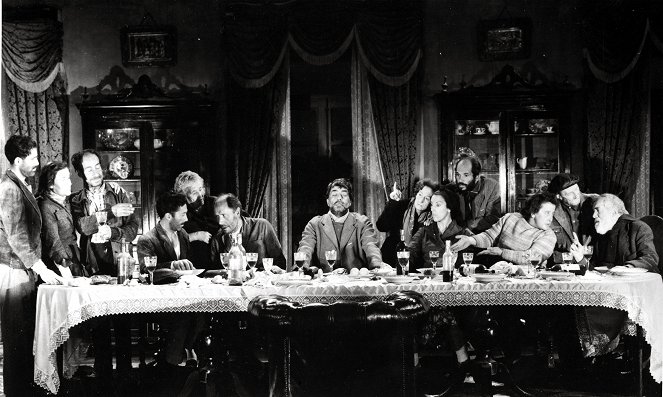Réalisation:
Luis BuñuelPhotographie:
José F. AguayoActeurs·trices:
Silvia Pinal, Francisco Rabal, Fernando Rey, José Calvo, Margarita Lozano, Victoria Zinny, Claudio Brook, José Manuel Martín, María Isbert (plus)Résumés(1)
Belle comme le jour, Viridiana entend bien consacrer son existence à Dieu. Avant de prendre définitivement le voile et de prononcer ses veux, elle rend visite à un oncle, Don Jaime, qui, autant troublé par sa ressemblance avec sa défunte femme que rongé par le désir, lui fait davantage que des avances. Repoussé, humilié, l'oncle libidineux se pend. A sa nièce, il laisse cependant en héritage un vaste domaine que celle-ci transforme en refuge pour les nécessiteux. Des misérables qui n'en sont pas moins des hommes, tous irrésistiblement attirés par leur ange de miséricorde... (Sidonis Calysta)
(plus)Critiques (3)
Luis Buñuel's famous work has, of course, lost its edges in many ways. Yes, contemporary cinema can certainly be more shocking, but, with all due respect to it, contemporary cinema can hardly go straight to the essence and, without unnecessary exaggeration, reveal the misery of mercy and austerity to the bone. Buñuel is a great aesthete, and I hunt in vain in my memory for a film with such a magnificent and organically integrated composition of the image... The aforementioned scene of the beggar feast is one of the highlights not only of the film, but of cinema as a whole. The perfect pointing-out of the idea through the paradoxical combination of image, music and their overall composition (the paraphrase of L. Da Vinci is eerily cynical heresy!) creates an incredibly impressive whole, from which the character of Viridiana, a beautiful woman committed to God and the service of the "suffering", must necessarily come out foolish and doomed to defeat. No wonder that the Church was irritated by it... Viridiana attacks with sensitive and supremely artistic means, not to insult and shout angrily, but only to reflect on the absurdity and true face of human nature. The absurdity of human action. If you save one suffering dog, you'll miss out on saving another one in no time. If you help a beggar out of the mud, he'll try to smear you. I watched Viridiana with a strange tremble and tension that only the films of the great masters arouse in me. It did not come from a surface that was seemingly peaceful and sedated, but rather it was based on the heart of a film in which the tragedy of a woman who dedicated her life to a great idea and was endowed with one great emptiness and disillusionment is born. With some criticism, I only look at Buñuel's all-embracing skepticism, but it is every artist's right to be subjective... Actually, that's what he's expected to do, right? The thorn crown burning scene seems to me like a really strong ace for the time period...
()
Après avoir lu la biographie de Buñuel, mon intérêt pour ses films a encore augmenté. Et après Un chien andalou, j’ai opté pour un moins connu, Viridiana. Ce film m’a énormément surpris. La première partie est assez lente, sérieuse et comporte une ambiance étouffante et tendue, puis on part sur quelque chose de légèrement plus comique. Je me régale chaque fois de la variété de personnalités des personnages, pour laquelle Buñuel a dû déployer un effort de recherche considérable pour ce film-ci. Une œuvre remarquable avec une excellente Silvia Pinal dans le rôle titulaire.
()
The message is very well conveyed in the movie, but unfortunately, that doesn't necessarily mean it will truly captivate you. There are scenes that are pleasantly different, unreal in their representation of reality, but there are also those that create a challenging path to the movie and its reception. Criticism of religion, however, is pleasant, no doubt, it's just somewhat alienating.
()

